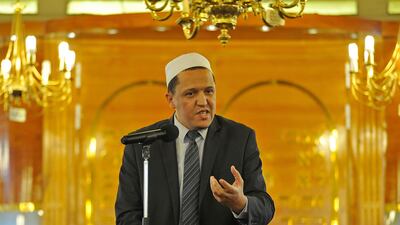PARIS // UAE religious scholars were urged by France’s chief of imams to have a stronger presence in that country to help improve tolerance there.
“If Mecca and Medina were the qibla of all Muslims, the UAE has become the qibla of tolerance,” said Hassen Chalghoumi, president of the conference of Imams of France, referring to the direction Muslims should face during prayer.
He called for scholars from the UAE and other Gulf countries to make frequent visits to churches and synagogues in France and engage in interfaith dialogue to prove that Islam is the religion of tolerance.
Moreover, there should be a strong base of scholars with proper knowledge of Islamic jurisprudence rather than radical religious leaders who currently have the strongest Islamic presence there, especially with the rise of France’s far right political party, he said.
“We are walking towards a civil war, because the far right deprives minorities of their rights,” said Mr Chalghoumi, who added that these lead young people to join ISIL and that the group has recruited 7,000 European youths.
He said that Iran should learn to rid itself of political Islam, as did Egypt when it rejected the Muslim Brotherhood regime.
Mr Chalghoumi made his statements as the UAE’s Muslim Council of Elders sat at the Paris city council palace with municipality officials and the Vatican’s lay Community of Sant’Egidio for the second round of an East and West dialogue mission.
Following the terrorist attacks that struck the city last November, the council sat with the aim to “break the barriers of the past”.
“We chose Paris because it is the city of intellect and thought and multiculturism,” said Dr Ali Al Nuaimi, the council chairman.
The history of dialogue between East and West was not encouraging because it had not “had real results that brought people together”, he said.
“We are still suffering from the struggles of the past regarding religious and cultural clashes, even though as people we have many things in common and when we meet there is an obvious sense of familiarity and harmony.”
Solving the Palestinian crisis was crucial to ending clashes between East and West, said Dr Ahmed El Tayyeb, Grand Imam of Al Azhar.
“In this context, we ask the world to put an end to the attempts of changing the identity of Al Aqsa mosque, because solving this conflict is the solution to end the major problems between the East and West.”
At the same time, people from the East must understand western civilisation and have an objective perspective of it.
“And the European side should stop their negative media portrayal of Muslims and offensives carried out against their Prophet,” said Dr El Tayyeb.
He stressed that Muslim citizens of Europe should have loyalty and nationalism towards their European states, “and that does not contradict with their Muslim identity”.
“We take our Prophet as a role model in this regard, when he created the Medina Convention, which was based on the principle of citizenship and equality of rights and obligations between various groups.”
Scientists, artists and scholars have an important role to play in bringing East and West together, said Anne Hidalgo, mayor of Paris.
“In order to understand each other, we must share in-depth knowledge of the other. We must discuss and analyse,” the mayor said.
hdajani@thenational.ae


